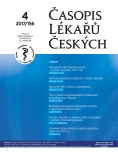Olfactory function in patients undergoing FESS for chronic rhinosinusitis
Authors:
Zdeněk Knížek 1; Jan Vodička 1,2; Pavlína Brothánková 1,2; Hana Shejbalová 1
Authors‘ workplace:
Klinika otorinolaryngologie a chirurgie hlavy a krku Pardubické nemocnice
1; Fakulta zdravotnických studií Univerzity Pardubice
2
Published in:
Čas. Lék. čes. 2017; 156: 187-191
Category:
Original Article
Overview
Patients with chronic rhinosinusitis (CRS) often suffer from loss of olfactory function. Rhinosinusitis can be treated either by medical therapy or surgically (FESS). Postoperative outcome in terms of improving sense of smell has been controversial so far. The aim of our study was to determine the patients who would have better postoperative outcomes in terms of improving olfactory function.
We collected data of patients undergoing FESS for chronic rhinosinusitis (either with or without nasal polyps) at our department during the years 2012–2015. These patients had their olfactory function examined with Odorized markers test (OMT) up to 24 hours before surgery. After that we chose the best result in OMT found out in visits from 4 weeks to 4 months after surgery. We were comparing individual risk factors out of the patients´ anamnesis, CT scan and physical examination.
51 patients were enrolled in this study. 25 % of patients showed improvement of their olfactory function, no change was recorded in 55 % of patients and 20 % of patients showed deterioration of olfaction. Before surgery we found out statistically significant difference in results of OMT between the patients with and without nasal polyps and with and without asthma (p = 0,0016, resp. p = 0,04). After surgery the difference was no longer statistically significant (p = 0,17, resp. p = 0,12). Correlation with age and Lund-Mackay score showed changes after surgery. No statistically significant difference in results of OMT was found out before and after surgery in other observed risk factors (oral corticosteroids before surgery, smoking, revision surgery and middle turbinate resection).
Changes in olfactory function in patients with chronic rhinosinusitis after surgery are hard to predict. Our results show that nasal polyps, asthma, lower age and higher Lund-Mackay score are factors which predict better postoperative outcome.
Keywords:
olfaction, FESS, rhinosinusitis, odorized markers test, nasal polyp
Sources
1. Fokkens WJ, Lund VJ, Mullol J et al. EPOS 2012: European position paper on rhinosinusitis and nasal polyps 2012. A summary for otorhinolaryngologists. Rhinology 2012; 50(1): 1–12.
2. Wardas P, Markowski J, Piotrowska-Seweryn A et al. Impact of rhinosinusitis symptoms on patients' self-esteem before and after FESS. Otolaryngol Pol 2014; 68(6): 293–297.
3. Szaleniec J, Wróbel A, Stręk P et al. Smell impairment in chronic rhinosinusitis – evaluation of endoscopic sinus surgery results and review of literature concerning olfactory function predictors. Otolaryngol Pol 2015; 69(1): 33–44.
4. Pade J, Hummel T. Olfactory function following nasal surgery. Laryngoscope 2008; 118(7): 1260–1264.
5. Litvack JR, Mace J, Smith TL. Does olfactory function improve after endoscopic sinus surgery? Otolaryngol Head Neck Surg 2009; 140(3): 312–319.
6. Jiang RS, Su MC, Liang KL et al. Preoperative prognostic factors for olfactory change after functional endoscopic sinus surgery. Am J Rhinol Allergy 2009; 23(1): 64–70.
7. Lund VJ, Mackay IS. Staging in rhinosinusitis. Rhinology 1993; 31(4): 183–184.
8. Keros P. On the practical value of differences in the level of the lamina cribrosa of the ethmoid. Z Laryngol Rhinol Otol 1962; 41: 809–813.
9. Vodička J, Menšíková A, Balatková Z et al. Fyziologické hodnoty čichových testů v české populaci. Otorinolaryngologie a foniatrie 2011; 60(3): 119–124.
10. Fang SY. Normalization of maxillary sinus mucosa after FESS. A prospective study of chronic sinusitis with nasal polyps. Rhinology 1994; 32(3): 137–140.
11. Rice DH. Middle turbinate resection: weighing the decision. Arch Otolaryngol Head Neck Surg 1998; 124(1): 106.
12. Kennedy DW. Middle turbinate resection: evaluating the issues-should we resect normal middle turbinates? Arch Otolaryngol Head Neck Surg 1998; 124(1): 107.
13. Friedman M, Katsantoni G, Rosenblum B. Endoscopic sinus surgery with partial middle turbinate resection: effects on olfaction. Laryngoscope 1996; 106: 977–981.
14. Soler ZM, Hwang PH, Mace J, Smith TL. Outcomes after middle turbinate resection: revisiting a controversial topic. Laryngoscope 2010; 120(4) :832–837.
15. Jankowski R, Bodino C. Olfaction in patients with nasal polyposis: effects of systemic steroids and radical ethmoidectomy with middle turbinate resection (nasalisation). Rhinology 2003; 41(4): 220–230.
16. Banglawala SM, Oyer SL, Lohia S et al. Olfactory outcomes in chronic rhinosinusitis with nasal polyposis after medical treatments: a systematic review and meta-analysis. Int Forum Allergy Rhinol 2014; 4(12): 986–994.
17. Murthy P, Banerjee S. Predictive factors for a good outcome following endoscopic sinus surgery. Indian J Otolaryngol Head Neck Surg 2013; 65(Suppl. 2): 276–282.
18. Minwegen F, Thomas JP, Bernal-Sprekelsen M et al. Predictive value of disease severity on self-reported rating and quantitative measures of olfactory function outcomes after primary endoscopic sinus surgery. A prospective study. Rhinology 2014; 52(4): 437–443.
Labels
Addictology Allergology and clinical immunology Angiology Audiology Clinical biochemistry Dermatology & STDs Paediatric gastroenterology Paediatric surgery Paediatric cardiology Paediatric neurology Paediatric ENT Paediatric psychiatry Paediatric rheumatology Diabetology Pharmacy Vascular surgery Pain management Dental HygienistArticle was published in
Journal of Czech Physicians

- Metamizole vs. Tramadol in Postoperative Analgesia
- Metamizole at a Glance and in Practice – Effective Non-Opioid Analgesic for All Ages
- Advances in the Treatment of Myasthenia Gravis on the Horizon
- Current Insights into the Antispasmodic and Analgesic Effects of Metamizole on the Gastrointestinal Tract
- Spasmolytic Effect of Metamizole
Most read in this issue
- Newborn hearing screening – importance, current state in the Czech Republic
- Sore throat treatment
- Sleep-related breathing disorders in children and adults from the aspect of the otorhinolaryngology
- 30 years of the cochlear implantations in the Czech Republic
